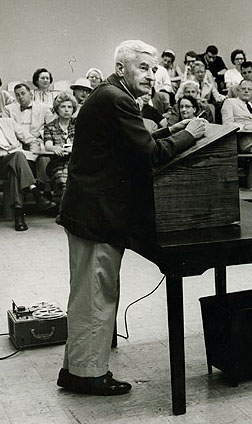Audio Clip
| CLOSE WINDOW TO RETURN TO MAP |

 Photograph by Ralph Thompson © Rector and Visitors, University of Virginia |
During the 1957 and 1958 Spring semesters, William Faulkner was the Writer-in-Residence at the University of Virginia. During that time he appeared at thirty-six different public events, reading from his work and answering over 1400 questions from students, faculty and others. Thanks to two members of the Department of English, Frederick Gwynn and Joseph Blotner, most of those sessions were recorded, and preserved on tape in the University of Virginia Special Collections Library. Over 28 hours of the recordings have been digitized, and are available online in the Faulkner at Virginia audio archive . The mp3 clips available below have been taken from that archive, and are playable on most devices. What do you mean by "dead"? (25 February 1957; 1:43) |
What did you mean by "dead"? (25 February 1957; 1:43)
John Coleman: What do you mean, Mr. Faulkner, in your story, "All the Dead Pilots," and I believe a story called "Honor," in which you give the impression that those people who fought in the war, after those experiences of war, will be dead the rest of their lives?
William Faulkner: Well, in a—in a way they were. That the—the ones that—that even continued to live very long were the exceptions, and the one among them that coped with the—the change of time or—you can count them on your thumbs almost. Rickenbacker's one, but there are not too many others. Bishop, he finally drank himself to death, died last year, and the others, Victor Yeats didn't live ten years. But then in a way they—they—they were dead, they had exhausted themselves psychically, whatever it was, but anyway, they were unfitted for the world that they found afterwards. Not that they rejected, they simply were unfitted. They had worn themselves out.
John Coleman: You'd restrict that feeling to people who had been in aviation, not with people who had served in other branches of the armed services?
William Faulkner: At that time, yes, because there was more concentration of being frightened of flying then than in infantry or—or ground troops. You just got—got scared worse quicker and more often—
John Coleman: Yes.
William Faulkner: Flying than you did on the ground.
